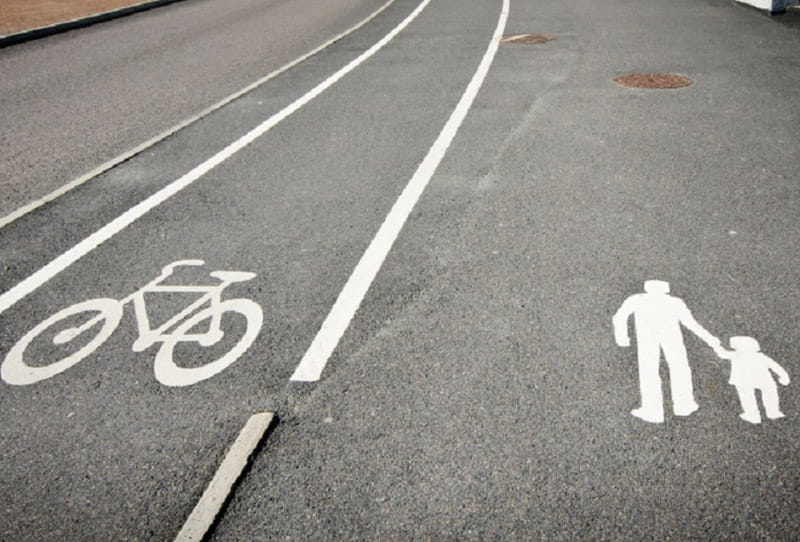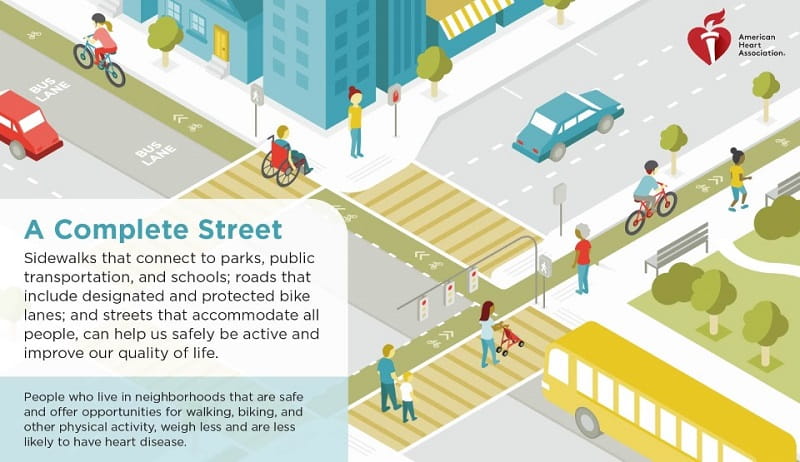El Paso aims for streets that are friendly for all users

The City Council in El Paso, Texas, has unanimously passed a policy that will improve street safety and promote active living for over 670,000 residents as well as millions of visitors each year.
Communities with "complete streets" that include bike lanes, sidewalks, crosswalks and curb ramps improve everyone's health by making it easier and safer to be active. El Paso's Complete Streets policy was developed over a two-year period as a partnership between the city and the El Paso Complete Streets Coalition led by the American Heart Association.
El Paso was ranked 18th among the most dangerous cities for street safety in a recent report released by Smart Growth America.
In an online community forum of local leaders and national experts, residents shared data about the condition of local streets and identified locations where Complete Streets design elements would improve public safety. Examples included lack of crosswalks, utility poles in the middle of sidewalks, long crossing distances, lack of shade, and sidewalks that end and force people to walk into roadways.
Community design principles in the new policy, informed by residents, will reduce the number of traffic-related deaths and injuries, the key mission of Vision Zero, a strategy to increase safe, healthy and equitable mobility for all.

The new policy, approved July 19, remained a focus for the coalition despite challenges posed by the pandemic, which arose soon after the advocacy effort began.
"The Complete Streets Coalition was a critical partner to the city in achieving policy implementation and truly embodied democracy in action," said City Representative Cassandra Hernandez, a champion for complete streets on the El Paso City Council. "Their work towards a linked network suitable for walking, biking, transit and towards Vision Zero is at the heart of the coalition's mission for a safer and healthier El Paso."
A community education campaign was focused on designing streets for all users and brought attention to El Paso neighborhoods that have historically been neglected. The education campaign, led by the AHA with funding from the Centers for Disease Control and Prevention, is part of a larger initiative to improve health for all El Pasoans through the CDC's Racial and Ethnic Approaches to Community Health program.
The city will now create an internal Technical Review Committee and external Mobility Advisory Committee to analyze future road work for a safe, equitable multimodal transportation network, prioritizing historically under-resourced communities. The Mobility Advisory Committee will include members of the public and diverse stakeholders to increase community engagement and accountability for implementation of the new streets policy.
The timing of the policy's approval could not have been better, advocates say. El Paso is slated to receive more than $20 million in federal funding for transportation and infrastructure, including one component to fund transportation equity. More funding under the federal infrastructure bill for streets could be applied for and released to the city in the future.
Working alongside the AHA are other members of the El Paso Complete Streets Coalition, including:
- AARP
- Action for Healthy Kids
- Center for Community Health Impact
- Centro San Vicente
- CityHealth
- El Paso Diabetes Association
- El Paso Independent School District
- Farm and City
- Frontera Land Alliance
- Green Hope Project
- Live Active EP
- Medical Center of the Americas
- Moms on Board
- Paso del Norte Health Foundation
- Podium Finish
- Quantum Engineering Consultants
- Race El Paso
- Rio Grande Area Agency on Aging
- Smart Growth America
- Texas Tech University Health Sciences Center
- University Medical Center Trauma
- Velo Paso
- Volar Center for Independent Living
- YMCA
For help in leading similar policy change in your community, submit a support request to the AHA's Active Living Support Team.





